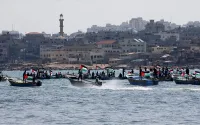Common Dreams / Published on Wednesday, January 16, 2008 by Reuters/UKRobert Evans
Cluster bombs, which nearly 100 countries are seeking to ban, should not be considered bad as long as states involved in conflicts use them responsibly, a senior United States official said on Wednesday. 
The official, who declined to be identified, also told a background briefing that Washington was planning to create a “quick reaction force”, or QRF, to handle threats to civilians from remnants of war, like cluster bombs.
The official’s remarks, which could not be quoted directly, clearly confirmed that Washington — like Russia, China and some other powers — remained opposed to banning the weapon.
He spoke as negotiators on updating a 1981 international agreement on especially dangerous conventional weapons (CCW) met in Geneva to prepare for “expert discussions” on cluster weapons next year under the United Nations umbrella.
Cluster munitions include a variety of weapons that can spread up to hundreds of bomblets over a target area. Up to 30 percent fail to explode, posing a threat to civilians for many years after a conflict.
The International Committee of the Red Cross says some 400 million people in countries and regions like Iraq, Afghanistan, Lebanon and Russia’s Chechnya live in effective minefields, under daily threat of maiming from cluster bombs.
Other campaigners say at least 13,000 civilians are known to have been killed or injured by the bombs — used heavily most recently by Israel in its 2006 war against Hezbollah guerrillas in Lebanon — in recent years.
OSLO PROCESS
Norway has been leading an international effort known as the “Oslo Process” to shape a treaty banning the weapon by a meeting in Dublin in May this year, which would then be open for signature before the end of 2008.
Campaigning group Cluster Munitions Coalition (CMC) says nearly 100 countries had come out in support of a ban by the last meeting in Vienna in December, although some like Germany, France Italy and Japan want a transitional period first.
CMC said after the Vienna gathering, attended by representatives from 138 countries that a lot of progress had been made on clearing affected areas and a deadline for destroying stockpiles.
“And those who do not sign the treaty need to be very aware what the international community will think of them,” CMC spokesman Thomas Nash declared at the time.
At Wednesday’s briefing, the senior U.S. official said Washington did not view the CCW talks, in which 103 countries are taking part, as in competition with Oslo but that they should be the prime focus for dealing with cluster weapons.
He said that the CCW should focus on ensuring that countries knew how to use the weapons in a way that was in full accordance with international humanitarian law.
A printed statement from U.S. officials said that “in keeping with the United States commitment to deal comprehensively with all threats posed by conventional weapons and explosive remnants of war” it would shortly move towards creating a QRF.
The move would come in the form of a “procurement notice” to develop the force.
“This force would respond globally to short notice and emergent humanitarian operations that require the removal or mitigation of explosive hazards to protect civilian populations,” the statement said.
Editing by Charles Dick






